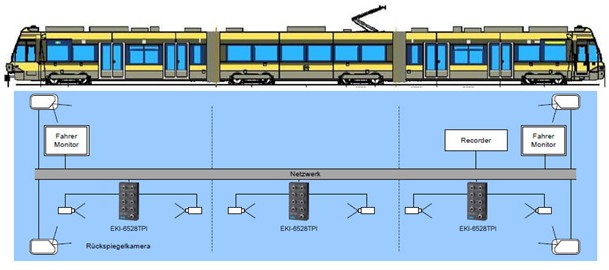Cámaras IP con PoE para Garantizar la Seguridad de los Pasajeros
| New video surveillance solution on trains uses Power Over Ethernet for its IP cameras |

Market: Intelligent Transportation
Location: Germany
Customer: Funkwerk Information Technology
Project Introduction:
Increasing concerns over public safety has meant that video surveillance applications are growing fast. In particular, public transport systems like trains and metro systems can now take advantage of the latest technologies and industry standards. Surveillance systems play an important role in reassuring and protecting the public, but by far the most common video surveillance applications in trains are for crime/vandalism prevention and accident investigation. Video surveillance plays its part by preventing crime and keeping mishaps from becoming tragedies. The challenge for today's transportation system integrators developing video surveillance solutions for trains is designing solutions that doesn’t rely on dedicated power outlets, can accommodate existing technology, yet still be robust enough to meet the rigors and vibration of trains speeding along steel tracks and through tunnels.
System Requirements:
Funkwerk Information Technology are based in Karlsfeld near Munich and specialize in Passenger Information Systems and Mr Bruno Hoefer is their hardware development leader. Recently they were awarded an important train video surveillance project for a large customer in Europe. The project required several cameras to be placed throughout the carriages and above the doors, with rear-view cameras and display monitors in the front and rear driver compartments. The system needed an independent power supply and high quality video, so it was decided that IP cameras with Power over Ethernet (PoE) switches in each carriage were the best solution. This configuration also had the added benefit of reducing additional cost on cabling for power because PoE switches supply power to the cameras as well as transmit data. Additionally, the switches have a bypass function so in case a switch fails, additional network components would not be affected. The IP cameras were connected to PoE switches and data was transmitted to the drivers cab for storage on a video recorder. The whole system was designed to be "standalone" meaning power for the cameras was acquired through the PoE switches and all video data was to be downloaded to the central control hub at the end of each day.
Future upgrades might include automatic real-time downloads to the fixed network for faster more economic data handling. Also, because IP cameras are digital, analytical video applications could be implemented such as for face or unused baggage recognition.
System Implementation:
Advantech helped Thales to find the right solution that used 380 UNO-2173AF Embedded Automation Computers with Intel® ATOM™ N270 processor, low energy consumption and a fanless design that would be connected to the emergency buttons and alarm that would then control 1,140 ADAM-4150 sensor-to-computer interface units that would automatically open the ticket gates.
The complete system is very compact and efficient and without cooling fans is a compact trusted industrial solution.
Project Implementation:
| Product |
Description |
EKI-6528TPI |
EN50155 8-port M12 Unmanaged PoE Switch with Wide Temperature |
System Diagram:

Conclusions:
Mr Hoefer told us, “Funkwerk offers infrastructure operators a market-proven and powerful portfolio of solutions for safe and efficient railway operations. As safety is key for us we deploy Advantech’s EKI-6528TPI with the EN50155 certification. Advantech’s products provide highly reliable connectivity and allow us to deploy the PoE switches with 24Vdc. We appreciate working with Advantech who is a leader in industrial automation. Their products make it possible to guarantee smooth train communication in the event of power failure in a carriage.”
Funkwerk maintains a close working relationship with Advantech who were able to supply several product samples at short notice for testing which in turn helped their application development and validation early on. Mr Hoefer explained, "In order to keep being successful, we need to offer advanced technology and competitive prices. If problems occur there is always a fast reaction from their engineers so that we can keep our customers satisfied—and in this business, that's important." |